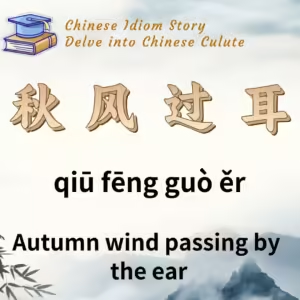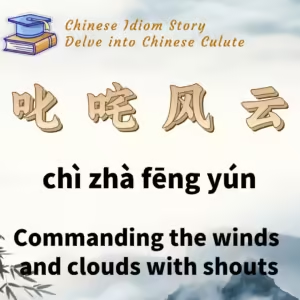
Chinese Idiom: 秋风过耳 (Qiu Feng Guo Er)
English Translation: Autumn wind passing by the ear
pīn yīn: qiū fēng guò ěr
Idiom Meaning: This idiom signifies that something is irrelevant or of no concern to oneself; it expresses indifference toward certain matters.
Historical Source: “吴越春秋” (Spring and Autumn Annals of Wu and Yue) by Zhao Ye during the Han Dynasty.
Idiom Story:
In the Spring and Autumn period, King Shoumeng of Wu had four sons: the eldest, Zhu Fan; the second, Yu Ji; the third, Yu Mei; and the youngest, Ji Zha. Among them, Ji Zha was exceptionally virtuous and talented, earning the king’s favor. King Shoumeng desired to pass the throne to Ji Zha.
In 561 BC, as King Shoumeng fell gravely ill, he summoned Ji Zha and expressed his wish to hand over the throne. However, Ji Zha respectfully refused, believing that the established customs dictated the throne should go to the eldest son, and he could not violate this tradition. Unable to persuade Ji Zha, King Shoumeng called Zhu Fan and shared his intention, urging him to remember Ji Zha’s worth when he assumed the throne.
After the king’s death, Zhu Fan succeeded him and gathered his brothers, Yu Ji and Yu Mei, to inform them of their father’s dying wish. They vowed that the throne would be passed down in order of birth, ensuring Ji Zha would eventually inherit it.
As time passed, Zhu Fan and his brothers ruled one after another, and Ji Zha served loyally in the administration, further enhancing his reputation. When Yu Mei was on his deathbed, he insisted that the throne be given to Ji Zha, who still refused, stating, “Wealth and honor are to me like autumn wind passing by the ear.” This statement reflected Ji Zha’s disdain for power and wealth, asserting that he was unaffected by worldly gains.
To show his commitment to this principle, Ji Zha privately left to hide in his fief at Yanling (now Changzhou, Jiangsu). It wasn’t until 526 BC, when Yu Mei’s son, Liao, was crowned as the King of Wu, that Ji Zha returned to assist in governance.
The famous phrase “富贵之于我,如秋风之过耳” (Wealth and honor are to me like autumn wind passing by the ear) has been celebrated through the ages, ultimately giving rise to the idiom “秋风过耳,” symbolizing indifference toward material wealth and power.






